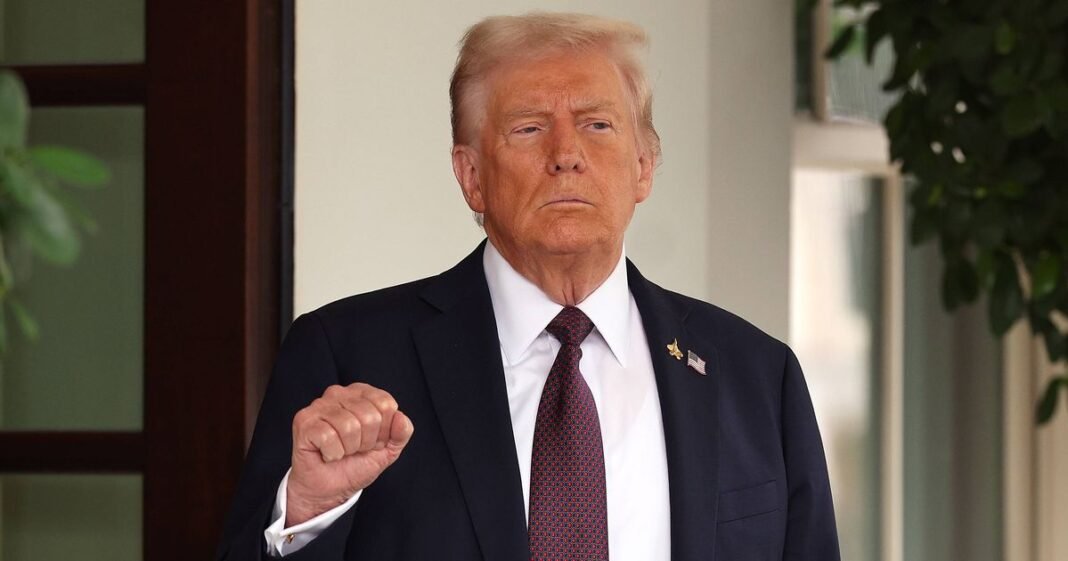President Donald Trump and Defense Secretary Pete Hegseth have proposed utilizing American cities as training grounds for the armed forces, hinting at the concept of an “invasion from within” that may necessitate employing “overwhelming and punishing violence on the enemy.”
While the primary role of the US military is traditionally focused on addressing external threats, Trump has put forth the idea of deploying military forces within American cities. This proposal was discussed by Trump and Hegseth, a former Fox News commentator, in front of a gathering of numerous high-ranking military officials hastily assembled in Virginia.
During the meeting, the officials were briefed on the physical conditioning of troops and their allegiance to the initiatives against diversity, equity, and inclusion (DEI) put forth by the Trump administration. Within this unusual setting, President Trump made an authoritarian declaration, stating, “I told Pete [Hegseth], we should use some of these unsafe cities as training locations for our military. It’s about addressing the internal threat before it escalates,” with alleged reference to criminal elements and immigrants.
These statements underscore the Trump administration’s endeavors not only to transform the prevailing culture at the Pentagon but also to leverage military assets for the administration’s agenda, particularly in domestic affairs. This includes suppressing opposition to the administration’s perceived excessive displays of force in Democratic-run cities characterized by what he labels as “out of control” violent crime.
“We are facing an internal invasion, akin to a foreign adversary but more complex due to the absence of uniforms,” Trump remarked.
Hegseth summoned a significant number of military leaders and their advisors to the Marine Corps base in Quantico, without disclosing the purpose publicly. According to The Associated Press, his address primarily emphasized familiar themes portraying a military constrained by “woke” policies, and he recommended that military leaders should resign if they oppose his new direction.
Although interactions between military leadership and civilian authorities are routine, this particular assembly sparked intense speculation due to its sudden organization and secretive nature. The fact that high-ranking military officials from conflict zones were convened for a discourse on issues of race and gender within the military underscores how the nation’s cultural debates have become a focal point for Hegseth’s Pentagon, despite ongoing global security concerns.
Bryan Clark, a senior fellow and director of the Centre for Defence Concepts and Technology at the Hudson Institute, observed that the Defense Secretary’s speech seemed more aimed at generating publicity than aligning leaders around the Trump administration’s agenda.
Clark noted there was an expectation that Hegseth would discuss budget priorities, military investments, or the forthcoming national defense strategy, which is anticipated to be revealed by the Pentagon soon.
He remarked that the message at the event, which brought together hundreds of senior military figures, did not match the seriousness of the occasion. “One might have anticipated a more significant and critical purpose than grooming standards and physical fitness requirements,” he added.
Janessa Goldbeck, a former Marine and current CEO of the Vet Voice Foundation, criticized the defense secretary’s speech as more focused on fostering grievances rather than enhancing the military’s capabilities.
She rebuked Hegseth’s proposal to relax disciplinary standards in the military, equating toughness with abuse, as the actions of someone lacking true experience. “It requires real strength to educate a recruit, not to strike one,” she emphasized.
Reflecting on her time at Marine boot camp in California, Goldbeck highlighted the rigorous training provided by disciplined and professional Marines, pointing out that Hegseth lacks first-hand experience as a drill instructor or in training recruits.
She criticized the secretary for maintaining an outdated, exaggerated perception of toughness, diverting attention and resources to what she termed as unnecessary cultural conflicts.
Meanwhile, Trump has already pushed the limits of the Posse Comitatus Act, a federal law dating back almost 150 years that restricts the military’s involvement in enforcing domestic laws.
He has deployed National Guard and active duty Marines to Los Angeles and threatened similar actions to address alleged crime and illegal immigration in other Democratic-led cities like Portland and Chicago, while enhancing troop presence at the U.S.-Mexico border.
Although National Guard members are typically exempt from the law as they operate under state authority, when federalized and placed under the president’s command, as seen in Los Angeles despite objections from the Democratic governor, the law applies to them.

